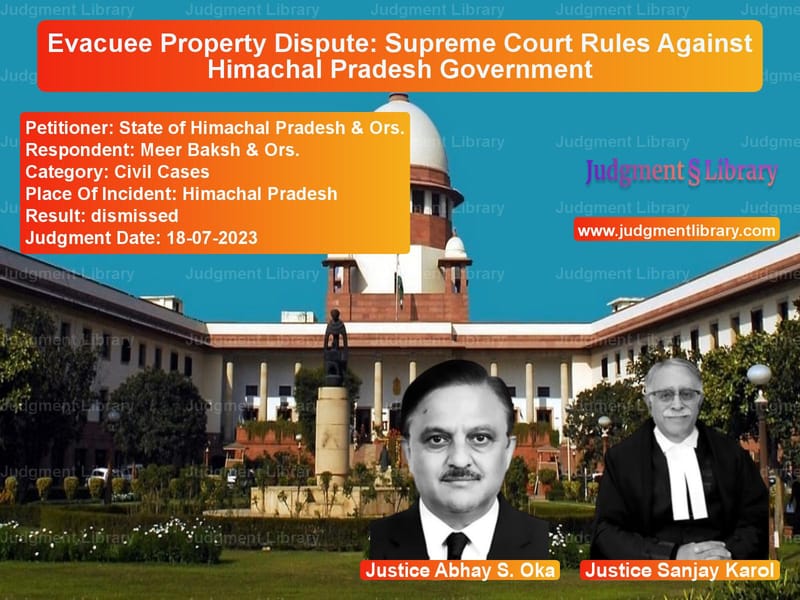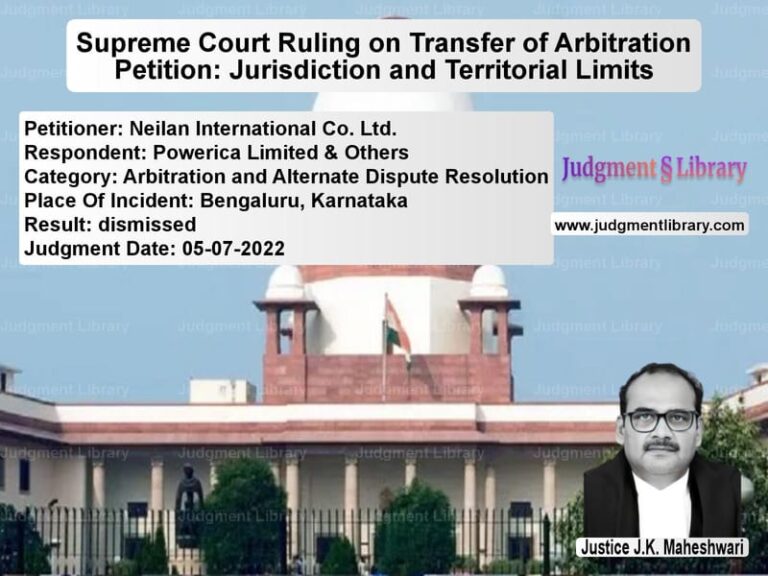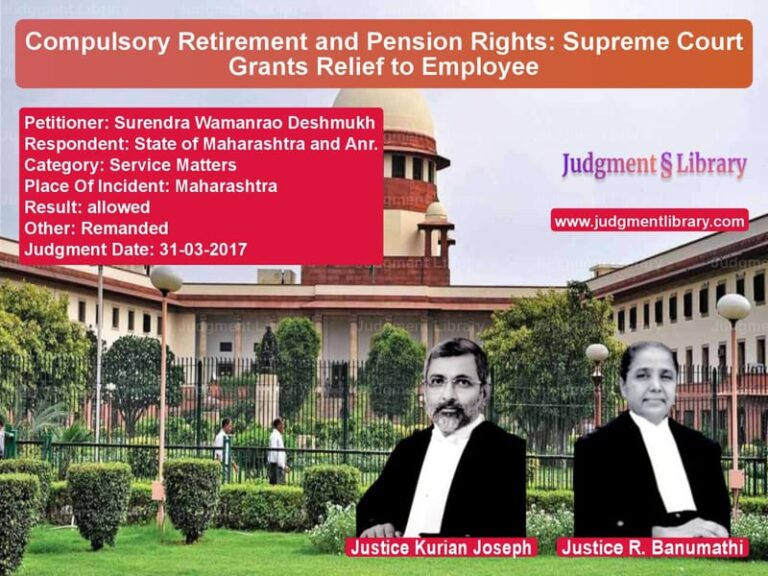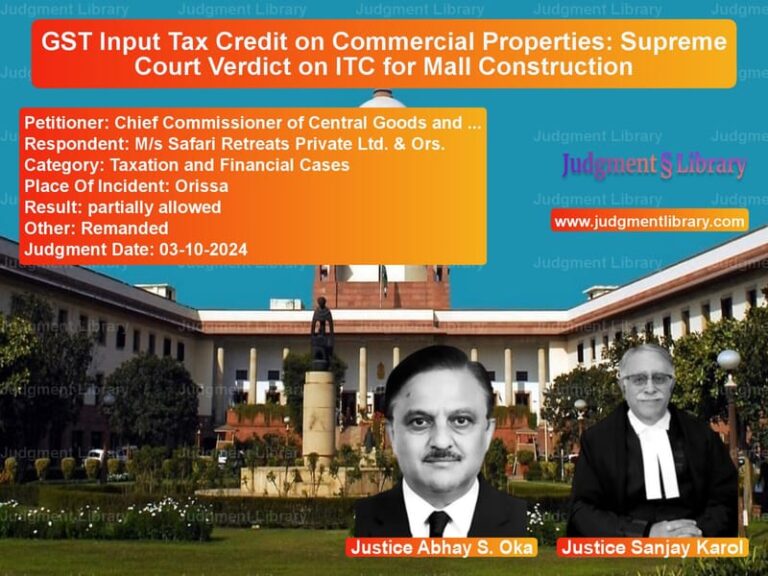Evacuee Property Dispute: Supreme Court Rules Against Himachal Pradesh Government
The case of State of Himachal Pradesh & Ors. v. Meer Baksh & Ors. revolves around a long-standing dispute regarding property classified as ‘evacuee property.’ The Supreme Court of India, in its judgment, examined whether a certain property owned by one Sultan Mohammad could be classified as evacuee property under the Administration of Evacuee Property Act, 1950. The Court ruled in favor of the respondents, holding that the property was wrongly classified as evacuee property since the owner had never left India.
Background of the Case
The dispute began when the Himachal Pradesh government classified a property held by Sultan Mohammad as evacuee property under Section 2(f) of the Administration of Evacuee Property Act, 1950. The State argued that since Sultan Mohammad was an evacuee under Section 2(d) of the Act, his property rightfully belonged to the government.
However, the respondents, who were legal heirs of Sultan Mohammad, challenged this classification before the High Court, arguing that Sultan Mohammad never migrated to Pakistan and had remained in Himachal Pradesh until his death in 1983. The High Court ruled in favor of the respondents, setting aside the classification of the property as evacuee property.
Read also: https://judgmentlibrary.com/supreme-court-upholds-delhi-metro-land-acquisition-rejects-lapse-claim/
Legal Issues Raised
- Was the property in question correctly classified as evacuee property under the 1950 Act?
- Did the Himachal Pradesh government have the legal authority to take over the property?
- Was the High Court justified in ruling that the classification was illegal?
Arguments Presented
Petitioners (State of Himachal Pradesh) Arguments
- The property owned by Sultan Mohammad was evacuee property as per Section 2(f) of the Administration of Evacuee Property Act, 1950.
- Since he was classified as an evacuee under Section 2(d), his property automatically vested in the government.
- The decision of the High Court was incorrect, and the state was within its rights to claim ownership of the property.
Respondents (Legal Heirs of Sultan Mohammad) Arguments
- Sultan Mohammad never migrated to Pakistan; he lived in Himachal Pradesh until his death in 1983.
- The Himachal Pradesh government admitted in its reply that he never left India, making it legally impossible for his property to be classified as evacuee property.
- The classification of the property was based on incorrect assumptions, and the state’s action violated their legal rights as heirs.
Supreme Court’s Observations
The Supreme Court examined the facts of the case and found that both the Single Judge and Division Bench of the High Court had correctly ruled in favor of the respondents. The Court noted:
“After having perused the judgment of the learned Single Judge, we find the learned Judge has held that it was categorically admitted by the State in its reply that the said Sultan Mohammad never left for Pakistan.”
The Court further emphasized that there was no evidence to show that Sultan Mohammad was an evacuee:
“Thus, we have to proceed on the footing that it is an admitted position that the said Sultan Mohammad never left India and therefore, he cannot be an evacuee within the meaning of the 1950 Act.”
Final Judgment
The Supreme Court dismissed the appeal filed by the State of Himachal Pradesh and upheld the High Court’s decision. The Court strongly criticized the state government’s decision to continue litigating the matter despite clear evidence that the classification was erroneous.
The Court also imposed a penalty on the Himachal Pradesh government for engaging in unnecessary litigation:
“We saddle the appellant-State of Himachal Pradesh with the costs of Rs.25,000/- (Rupees twenty-five thousand) to be payable to the Writ Petitioners before the High Court.”
Implications of the Judgment
This ruling has significant implications for cases related to evacuee property disputes. It reinforces the principle that properties cannot arbitrarily be classified as evacuee property without clear evidence. It also highlights the importance of government accountability in property disputes and discourages unnecessary litigation that burdens the judiciary.
Conclusion
The Supreme Court’s decision in State of Himachal Pradesh & Ors. v. Meer Baksh & Ors. is a landmark ruling that protects property rights and ensures that laws related to evacuee properties are not misused. By imposing a penalty on the state government, the Court has sent a strong message that such cases should not be pursued without substantive legal grounds.
Petitioner Name: State of Himachal Pradesh & Ors..Respondent Name: Meer Baksh & Ors..Judgment By: Justice Abhay S. Oka, Justice Sanjay Karol.Place Of Incident: Himachal Pradesh.Judgment Date: 18-07-2023.
Don’t miss out on the full details! Download the complete judgment in PDF format below and gain valuable insights instantly!
Download Judgment: state-of-himachal-pr-vs-meer-baksh-&-ors.-supreme-court-of-india-judgment-dated-18-07-2023.pdf
Directly Download Judgment: Directly download this Judgment
See all petitions in Property Disputes
See all petitions in Landlord-Tenant Disputes
See all petitions in Judgment by Abhay S. Oka
See all petitions in Judgment by Sanjay Karol
See all petitions in dismissed
See all petitions in supreme court of India judgments July 2023
See all petitions in 2023 judgments
See all posts in Civil Cases Category
See all allowed petitions in Civil Cases Category
See all Dismissed petitions in Civil Cases Category
See all partially allowed petitions in Civil Cases Category







